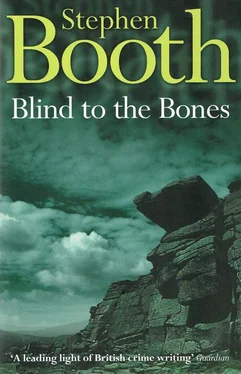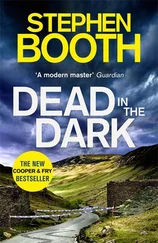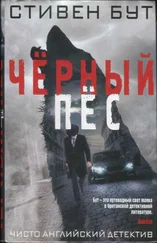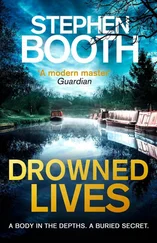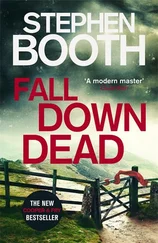Gail said it wasn’t logical to check the security of the house in the morning when he got up, as well as at night before he went to bed. She said it was obsessive. But Gail knew nothing. If their security had been breached during the night, it was vital to be aware of it straight away. There would be evidence to be gathered, a crime scene to be preserved intact for the arrival of the police. Not that the police would come, of course. But at least they wouldn’t be able to blame him for not having followed the proper procedures.
So Dearden made it a regular routine to carry out his inspection first thing every morning before he did anything else, particularly before Gail started drifting around the house, disturbing evidence without even noticing anything was wrong.
When he was finally satisfied that the lodge hadn’t been ransacked during the night, Dearden looked outside. Because of the elevated position of the house, he had a good view of the frontal approach, where the drive swung up off the road. There was no sign of anyone out there this morning. The postman might be along later on, if he came at all. Dearden had once investigated the possibility of buying the last hundred yards of the road from Withens and closing it off. The road wasn’t adopted by the highways authority beyond the village, so it wasn’t an official highway. But it had turned out that this section belonged to the farmer who owned the land on either side, and the farmer wouldn’t listen to reason when Dearden raised the idea.
The back of the house was the big problem. The yard and the huddle of outbuildings backed into the hillside. He was sure this was the way they had come in when they raided his property before. There were walls built against the hill, but they were bulging and slipping under the pressure and were no barrier to anyone determined enough.
Dearden walked out into the yard and knew immediately that something was wrong. He saw that somebody had knocked over the dustbin. They had strewn rubbish all across his yard.
‘Mr Dearden?’
Dearden jumped in alarm. How could he not have noticed the person standing near his side gate?
‘How did you get here?’
‘On my motorbike.’
‘What motorbike?’
‘It’s here, behind the wall.’
The motorbike was invisible on the other side of the stone wall. Dearden realized he might be making a mistake by only keeping an eye out for cars on the road.
‘What are you doing here?’ said Dearden.
‘Do you know who I am? I’m Philip Granger.’
‘Yes. It was your brother who was killed. Alex knew him.’
‘That’s right.’
Dearden struggled for a moment over what to say. Then he looked at the young man’s motorcycle leathers and black hair.
‘You’re related to the Oxleys, aren’t you?’
‘Lucas is my uncle,’ said Philip.
‘I’ll give you two minutes to get off my property.’
‘Sorry?’
Dearden gestured at the tipped-over dustbin. ‘Do you know anything about this? Were you here last night with some of your cousins?’
‘No. I—’
‘I don’t want you here. Your family is nothing but trouble.’
‘All I wanted to say was—’
‘Now you’ve got one minute.’
‘OK, OK, I’m going.’
With narrowed eyes, Dearden watched Philip Granger start up his bike and leave. Those people from Withens were getting even more brazen if they were wandering on to his property in broad daylight. Serious action would have to be taken.
Derek Alton picked up the stick that Lucas Oxley had given him. He bounced it in his palm a few times, enjoying the feel of the wood. He liked its solidity, and the smoothness of its grain. It had a satisfying weight and balance, as if it were a natural extension of his arm. When he held the stick up to the light, he could see the bruises and scarring along the length of the wood. But it was good, thick blackthorn. Blackthorn was best. He was lucky to get it, because there wasn’t much of it growing around Withens.
Then Alton frowned at the sight of a stain on the stick. It looked like a splash of red wine. Like communion wine, perhaps? But surely not at the altar of St Asaph’s.
With a sudden burst of energy, he swung the stick through the air, as if striking at something around head height. He had to imagine the noise and the impact. But the physical action, the rush of air, and the movement of the muscles in his shoulders all made him feel good, even exhilarated. He wanted to do a little jig on the stone flags, to open his lungs and let out a shout of joy. But this wasn’t the place or the time.
‘Death and renewal. Winter and spring. The darkness and the light.’
Though his voice was still quiet, it carried the entire length of the church. The sound bounced off the dusty stone lintels and the dark oak roof timbers. The word ‘light’ seemed to return to him in the cool air with a different note, sharper and more peremptory, as if it had been spoken by someone else. Alton swung the stick again, listening to the swish of its movement through the air. The sound was almost like music, a distant whisper of otherworldly voices, sighing for the coming moment, for the time to be right.
‘The beauty and the sorrow, death and renewal. The powers of light and new life.’
Alton wasn’t even sure that the Church of England fitted naturally into the landscape in this part of the country. Perhaps Withens needed something more muscular and rugged, more in tune with the cycle of the seasons and the implacability of nature. Perhaps it ought to be able to call on something more in keeping with the preoccupations of those wretched men who had been the first to live and die in Withens — the men killed and maimed in their hundreds building the tunnels. The men no one had cared about.
He had wondered about that when he first came to the place and had learned about its history. It had been the prosperous traders and landowners who had subscribed to build St Asaph’s, as an act of charity. But it was the blood of the ordinary working men that had consecrated the landscape.
Now he was getting too absorbed in the past again. It always made him feel depressed. He swung his arm once more, trying to work out what it was about the acoustics that made his voice sound so unfamiliar.
‘The darkness and the light. The light .’
Sometimes, it seemed to Alton that the entire area might be on the verge of reverting to paganism. Only the previous year, the May Day bank holiday festivities in the town of Glossop had culminated in the burning of a wicker man. Alton had thought this was the sort of thing that only happened in films, and when he had first read about it, he had an uneasy frisson. But he reassured himself that these things were most likely done for the benefit of the tourists these days. There couldn’t be any real belief involved in the rituals, could there? Yet local residents in Glossop had written their bad memories in envelopes and attached them to the wicker man, so they would be carried away by the flames. Superstition, that’s all.
His feelings were even more confused by the fact that the ritual had taken place at the Glossop Labour Club. Not only that, but events leading up to the burning of the wicker man had included an opening ceremony conducted by the local member of parliament, along with a pie and pea supper, a coffee morning and craft fair. For the children, there had been a short-story competition, a summer pageant, and a bouncy castle. All these were things that in other areas were associated with church fêtes.
There were times when he felt as though he was trying to fight back more than the encroaching nettles and bracken in his churchyard. Now and then, a dark shadow seemed to fall across his day-to-day reality, and he had a vision of himself battling against something just as insidious and persistent, and just as impossible to defeat.
Читать дальше
Конец ознакомительного отрывка
Купить книгу
